Catching up with the townies
I feel your heart in spades.
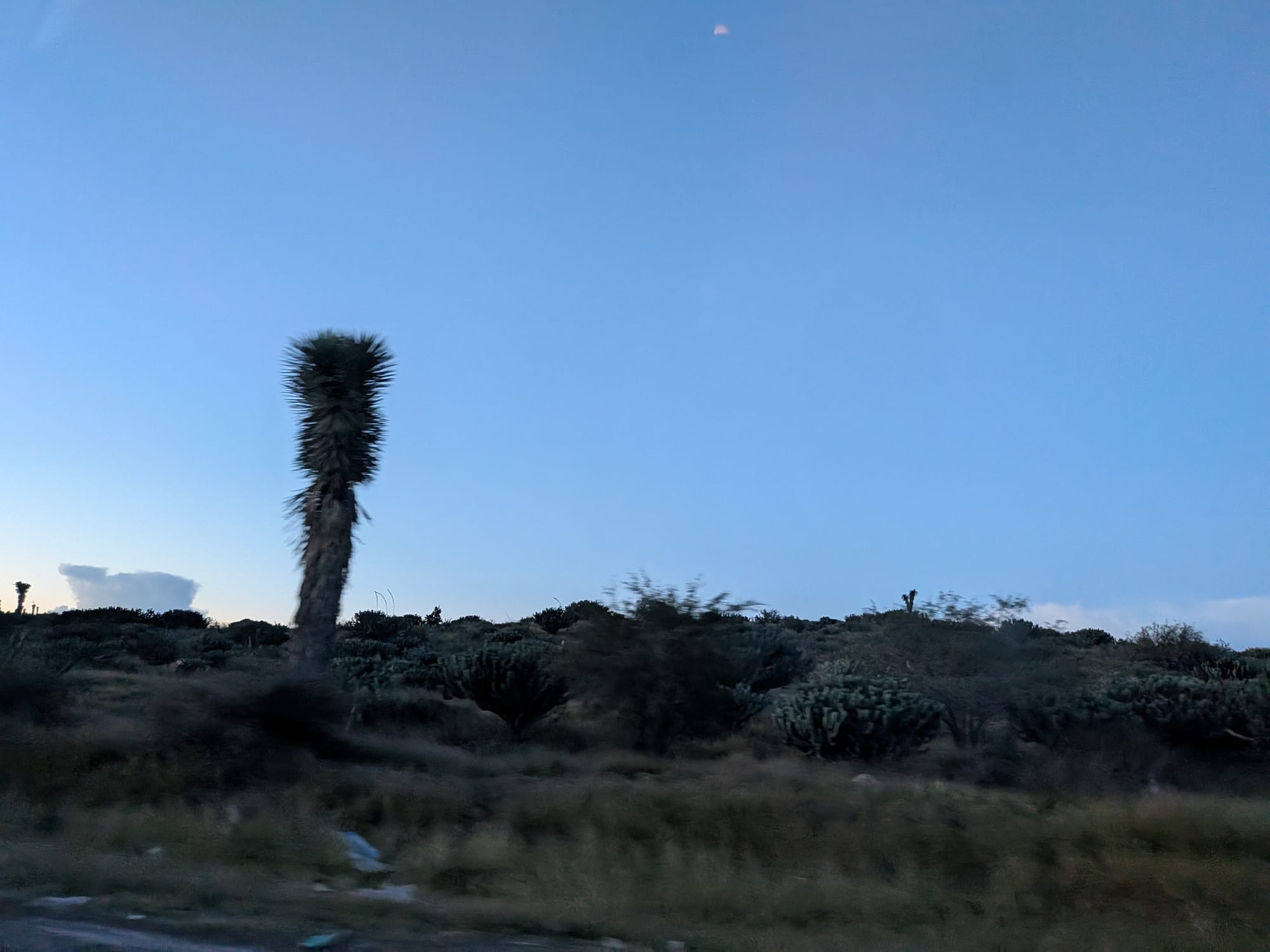
San Luis Poto-yes:
After my last post, I promised myself to write more often, to write shorter things with more frequency. It's been four months. What have I responded to lately? I don't have a response to One Battle After Another yet. The Phoenician Scheme was minor Wes. Headlights is occasionally breathtaking but also unfocused.
I had a good, busy summer—the highlight of which was spending a week in San Luis Potosí, Mexico. Being out of the country three times since November has been tremendous; living in America induces an unnatural paranoid psychosis to a degree where a place just a two-hour plane ride away is enough to remind you how damaging it is to live here. It benefits the psyche to know it's theoretically possible to opt out. I am thankful and privileged to feel like there is a place for us somewhere on earth, and not just because every congenial, mild-mannered taxi driver we encountered after asking where we're from expressed a desire that everyone in the car shared.
As we walked through SLP's centro, among its fountains and churches and storefronts and clubs named Mala Leche I was once again at peace in central Mexico. Sometimes I have a feeling like this when the weather is nice on a Saturday afternoon and very little is happening. But there is a feeling “more” “should” be happening. I could be out with friends, or I could be at Home Depot, or I could be cleaning the house or performing some other productivity ritual.
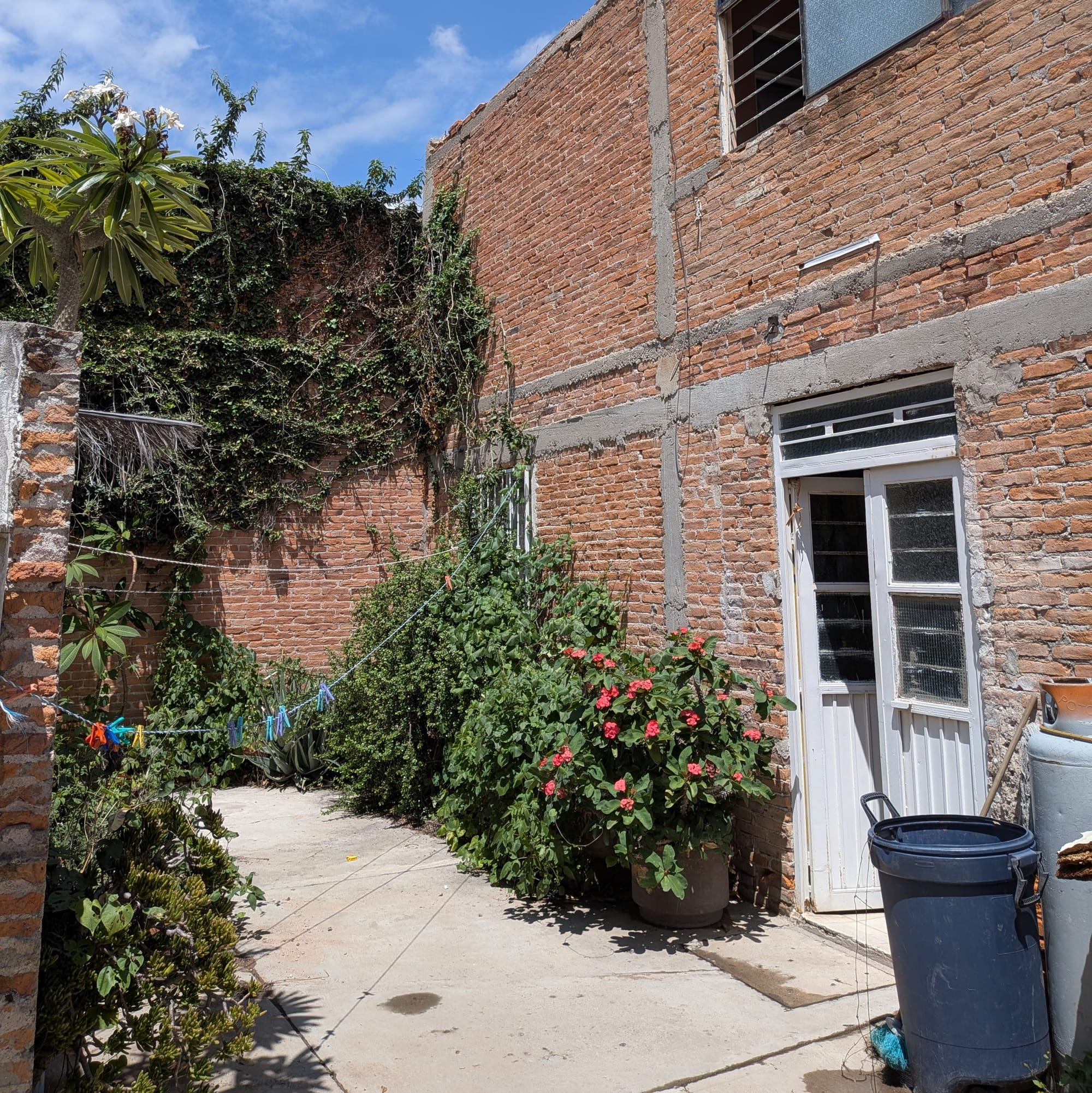
This was the absence of that. I think, “it would be great to read here” or “it would be great to write here” or “it would be great to live here.” But then I’m struck with “it’s also great to just exist here right now.”
The feeling I had in SLP was “this is amazing 10/10 would move here instantly if possible” followed with “yes but what would I do?” Like when people say, “I don’t have a dream job because I don’t dream of working.” Ok yes but what do you want to do. I want to read, and to write, and to eat good food. In the absence of place-based psychosis–and when one is religiously at peace–what is there? There was nothing left to desire when Natalia Lafourcade came on in the BlaBlaCar on the way back from Tamasopo.
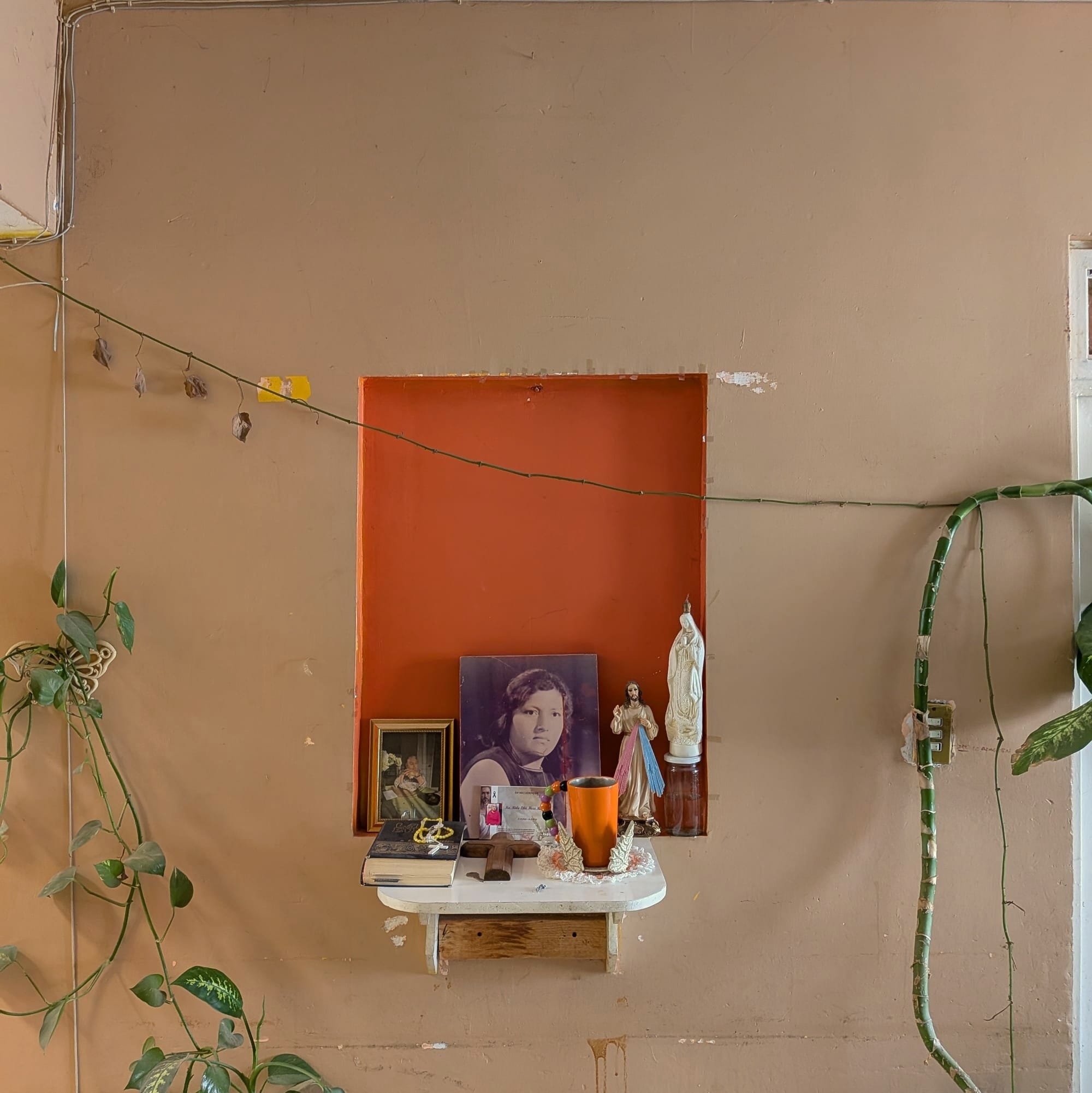
Why so serious:
There’s been a wave of self-consciously writerly, rock- and rock-adjacent records this year that piqued my interest. I approached all with intrigue; I speak of Ryan Davis, Greg Freeman, and Cory Hanson. The short of it is: these records are fine, but also fatally flawed.
Since indie-rock started flirting with country music (a tradition that goes back decades but of a more recent strain, since around 2019), I’ve been into it: I absorbed a taste for country early in life, even if I never thought it was cool, certainly not pop country, bro country, hip-hop country, whatever. You also won’t catch me extolling the virtues of “outlaw country” (let me guess, you loved rap music before it was about pimps and hos) or convincing myself anything labeled “alt-country” in the ‘90s/’00s is something I want to listen to.
My favorite thing about country music is the songwriting. My primary issue with these records is as simple as this: I don’t think they are well-written. Ryan Davis had the approval of God himself, David Berman, and he certainly sounds like him, but New Threats from the Soul (that title...) doesn't hold my interest over its seven songs of interminable length. There’s a too-clever-by-half pen here, and the influence of Silver Jews is suffocating. An offering like
I thought I could make a better life with bubblegum and driftwood
lacks the mysticism and poignancy of a great Berman (or Prine) line.
Digressions like
You can see the kingdom from the tailgate/If you stack a couple coolers, but you're never gonna see it from the front of the line/Well, I've seen the some of the suckers they've been letting in there/And I think that the firmament bouncer was a rock-pile buddy of mine
are plodding and purple. The middle-of-the-road roots rock doesn’t do anything for me. I can accept that this is not made for me, but also I'm trying my best to understand it. My verdict: it doesn’t have the juice.
I want to like Greg Freeman’s Burnover the most out of these—the band is loose but professional like major label Built to Spill (positive), he kinda sings like Wayne Coyne though (negative), and his Vermont-borne upper New England-based story songs are unique enough. For all it has going for it though, ultimately I find it basic indie rock bogged down with poetic attempts like
Heaven, like a ditch/will sometimes spill into the street at night/and pacify the muffled dreams of the broken-into cars/pass right by the broken dreams of the broken-into cars
that clunk off the ears. That he repeats the line over and over as attempted catharsis to a jaunty piano song demonstrates a lack of taste.
On and on the record goes–this dissonant quality of precious lyrics set to unexciting bar-rock is aiming for transcendence he can't attain. There isn't elliptical Martsch-quality to the words, there isn't an instrumental virtuoso to elevate or distract from how over-written the songs are. (The next song starts with “the sun set in vain.”) It dies on the vine.
Cory Hanson isn’t exactly in this lane—his record, “I Love People,” is instead pitch-perfect late-seventies Laurel Canyon-simulacra rock. The god @funkyassdg called it “evil Nilsson” which is accurate. But Nilsson never clicked for me. Zevon never clicked for me. I find something arch and alienating in this kind of songwriting. (Why do I love their contemporary counterparts like Mac DeMarco and MJ Lenderman though? Heart wants what it wants; maybe their existence in my lifetime allows me to view them as people, not dead icons.)
The melody on “Texas Weather” is nice, and the chorus is catchy, but the story it tells is incomprehensible. (I guess it references the Eagles, which, ok.) The opening one-two punch of “Bird on a Swing” and “Joker” give me “is this about to be great” pause, but they don’t hold up to scrutiny.
I am only kind to strangers/they’re the only people I don’t know
doesn’t communicate anything. In an attempt to express tongue-in-cheek alienation, it trips over itself. It may sound clever, or try for a smirk, but it doesn’t land. (Contrast to Berman’s own “lately I tend to make strangers wherever I go.”) The smoldering “Joker” offers this tantalizing, Neil Young-esque image:
All the standup comics/burn out on the evening train
But the hook turns on a wince-inducing “why so serious” joke. Hanson is doing something these guys are all doing: come up with one great line, or one neat metaphor, then stare at it for too long, shuffle their notes, tap you on the shoulder. Some of the best songwriters are funny, but the quickest way to make something not funny is to explain the joke. I'm not allergic to humor; I get that the point of this record in particular is to take some of the air out of serious, writerly singer-songwriter tropes. (The album title is literally in quotes; the cover is Hanson under literal crosshairs.) But the title track, a Supertramp vamp, just makes me angry. Like I don’t have time for this jokey nonsense in my life.
I’m haunted by Brad Shoup calling Zach Bryan “Saddle Creek emo.” There’s a way the media writes about something versus what the thing is versus what the artist is attempting to do that creates cognitive dissonance that can be hard to cut through. Bryan makes fundamentally hollow music. It’s flat, empty, try-hard. It's less about the Saddle Creek of it all and more about repackaging tired old tropes into the same old containers with new paint.
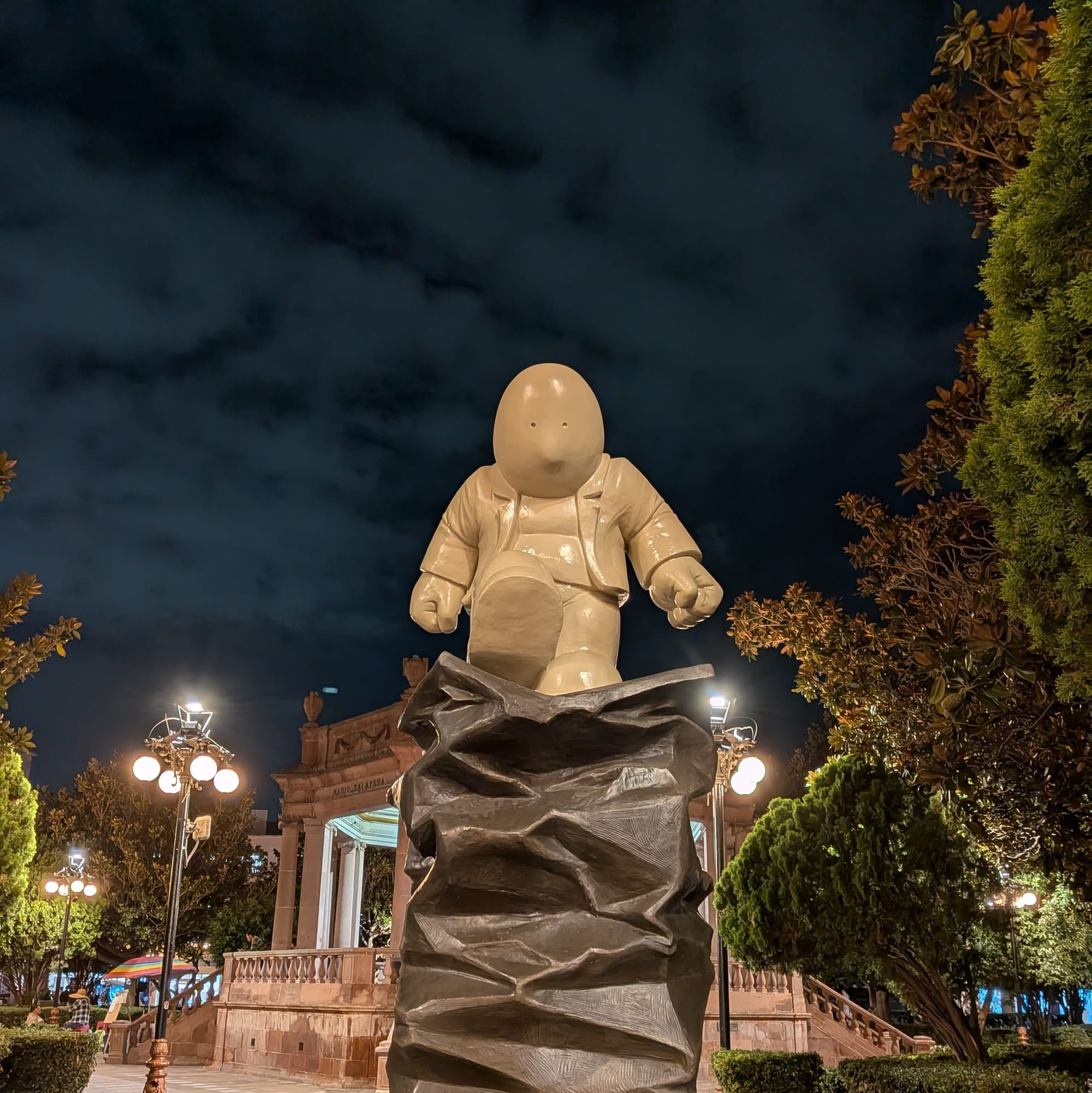
David Berman once wrote: “What's with all the handsome grandsons in these rock band magazines/what have they done with the fat ones/the bald and the goateed?” Berman was afflicted by the American malady of patriotism; one of the first thoughts I had when Biden won the presidency in 2020 was, as pyrrhic and hollow a victory it was, it might have meant something to him. (Berman attempted to end his life after the 2000 election; he died by suicide in 2019, during Trump 1.0.) If I hold Berman to the standard for what it means to be a rock lyricist, in that is a standard for white maleness, more specifically white American maleness.
I view “roots music” and “Americana” as contemporary white American traditions (whose roots are steeped in Black blues and folk songs but front-of-the-record-store-placard-Americana is what I'm thinking about). I'll never forget telling a friend I'm suspicious of white people who only listen to rock and roll but also suspicious of them if they only listen to rap, or music made by non-white people. Like ok xenophobe; ok culture vulture. I asked what should they be allowed to listen to? He said bluegrass.
I find “white boy” inherently funny because it denies full-grown autonomy to the white male, regarded as the most powerful creature on earth. Every elongated-testicle-looking fascist you see on the news is just, to quote a phrase, a punk-ass white boy. My favorite lines Sam Beam, a white boy, ever wrote, were on “Sodom, South Georgia,” when he sang:
All dead white boys say, God is good
White tongues hang out, God is good
While enigmatic, something I grasped the first time I heard the line at idk age 16 and the way I understand it now decades later is an expression of futility, how maleness, and the aspirational white Jesus and bearded old white man image of God himself, are beliefs in comfort against an indifferent reality. Beam underlines the cliched truth that all people die by reminding us how useless it is to be clever or devout or privileged or anything when you're dead. That's why I find clever white boys such an affront: what do they want from us? I take them on a case-by-case basis, giving grace to guys like DeMarco (Canadian), Lenderman (southern), and Ezra Koenig (sufficiently tortured by his whiteness) when they make music I like.
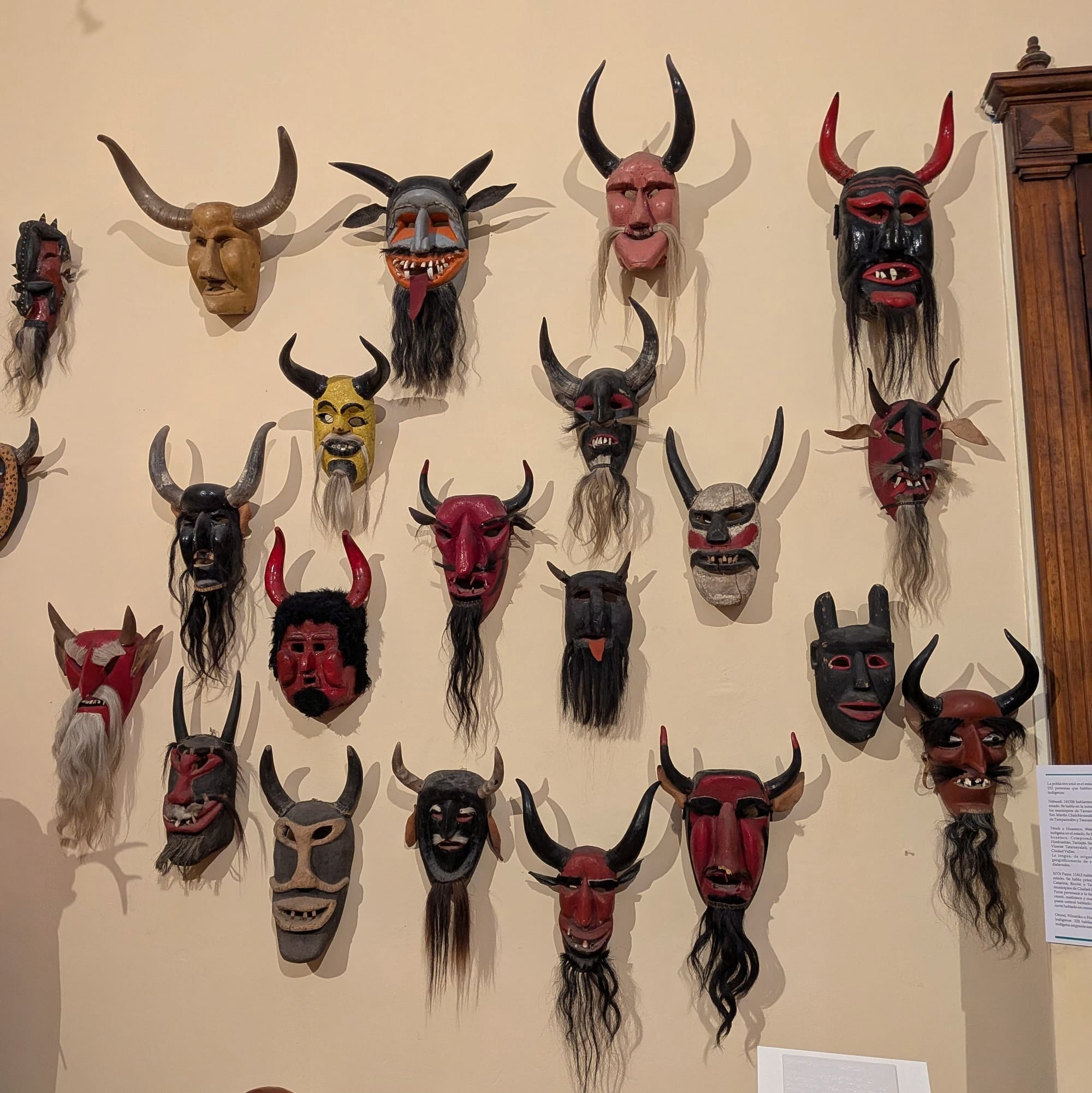
My favorite city’s artery:
The antidote to this is a record I’ve been unhealthily obsessed with, from 2024: This is Lorelei’s Box for Buddy, Box For Star. This Is Lorelei is the pseudonym for Nate Amos, one-half of Water From Your Eyes, a band that makes decent music if you qualify outlines of songs-with-potential as categorically good. The thing that got me to check out the record was of course Lenderman's cover of “Dancing in the Club,” an imperial move after he dropped a year-defining record.
The first time I heard the Lenderman version I thought “this is perfect, no way the original is touching this.” I love the shaggy dog quality of the lyrics—for every dramatic beat, there’s a line that's off-kilter enough to distort the song's focus. But in spite of jokey, yet wistful, evocations of Steely Dan (the cleverest white boys to ever exist) Amos is not asking us to think he’s smart; he’s sketching a slightly surreal short story shot with ennui, a sad song about falling out of love and hating yourself.
Box for Buddy, Box for Star isn’t strictly a concept album, but it feels like one. Vermont-born Amos is sober and writing from the perspective of someone who lived a lot and knows there’s more to come (“I think the future’s worth it” is one of the record’s most affecting lines). I hear every song as a monologue to his former self; he mourns all that he was. The record’s centerpiece, the six-and-a-half minute elegy “Where’s Your Love Now,” is a guy in his mid-30s asking himself where does the fervor go once you're happier and healthier. (Mac DeMarco does this with his latest album, Guitar, but the record, in spite of its occasional beauty, is somnambulant.)
“You left me to drink/I thought I’d die in my sleep” is about his struggle with alcohol addiction, but it also works as a metaphor about, as Brian Wilson once sang, hanging onto your ego. Who am I when all that I thought I was is gone? You’re probably mourned twice in life: the first time in the moment when all your friends from high school or college ask themselves where you are 20 years later; finally, when you do die. We’re only around one of those times. Box for Buddy, Box for Star is a requiem.
In its long songs, unconventional and amorphous song structures, and conversational lyrics, it doesn’t remind me of the Great White Men Songwriters but the long-winded writing of emo bands, or understated lyrically lyrical rap: I'm thinking Casiotone for the Painfully Alone and also Jonwayne or Oddisee. It dips into NPR-friendly Americana (his father is a bluegrass musician) with credibility and delivers a swooning Elliott Smith homage in “Two Legs” with its deadpan, body horror vision of “if you needed two legs/I’d give you mine,” a love-song couplet as the song's climax, a lightly humorous, imperfect, human expression.
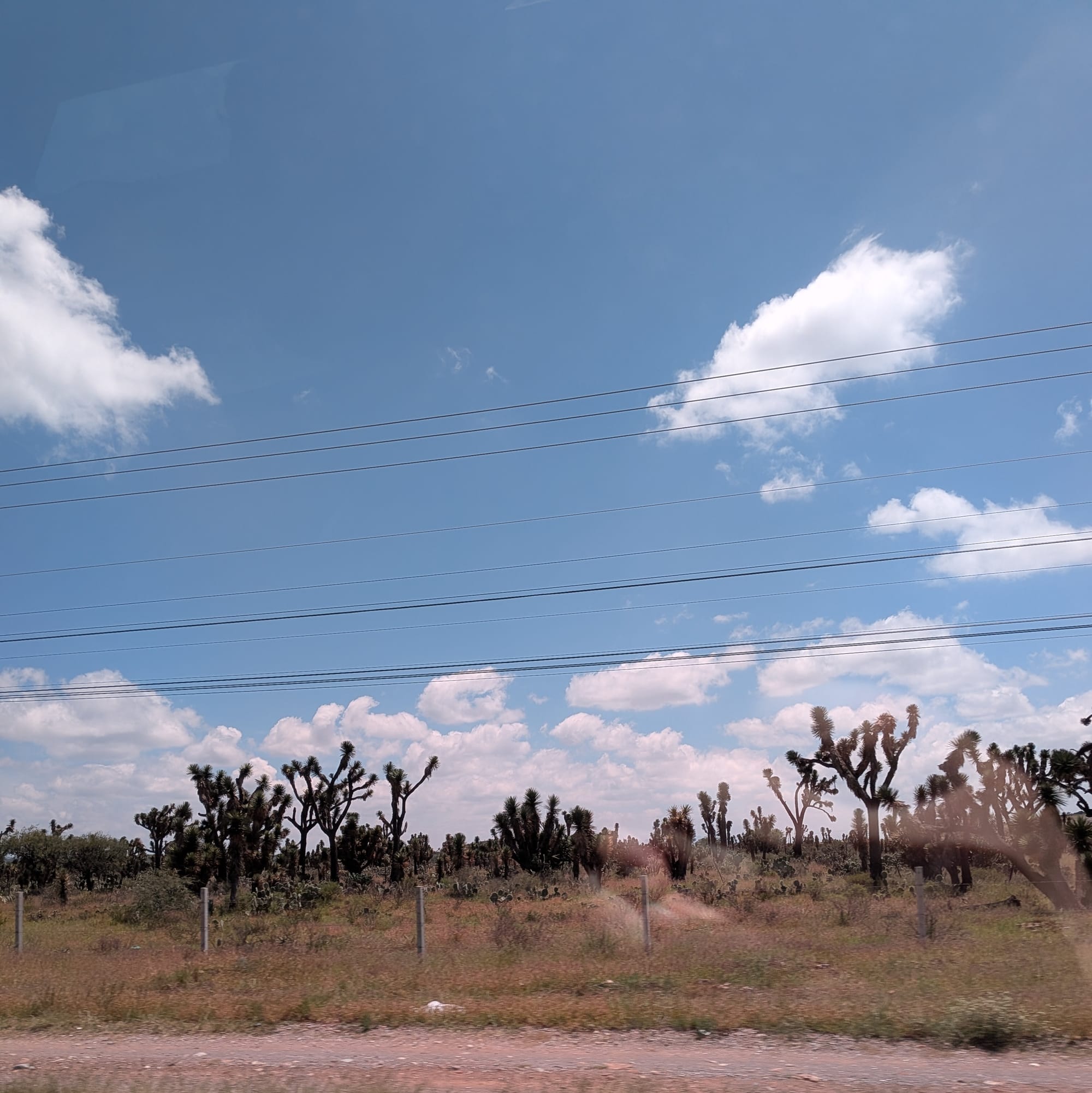
There's people in your house I've never even met:
As a city strike left trash bags to pile up on the hottest week of the year, in the magic hour surrealism of the final days of every June, I listened only to Derby’s Slugger on repeat. It’s not pastiche; it’s not let's-remember-some-guys; it’s not a performance of sincerity. It’s taking a gamble like adding a club beat to an Alex G riff, not just multi-tracking vocals to xeroxed Prince demos. It beats slop allegations because Derby's compositions are structurally perfect–while its influences are obvious, every hook and bridge and snaking coda is done with care, fine-tuning some of its fringier sounds (like on deep fried-2020 internet-music opener "Deer in the Belly of the Snake") into pop bliss. He's got bars about blasting the radio and the AC in the car in Houston heat, a two-step cheat code on a song called “Two-Step,” moments that chop me in the throat (“will you dance with me/until the ashes paint what’s left”). Apologies to Mr. Woods, this quirked up white boy probably released my album of the year
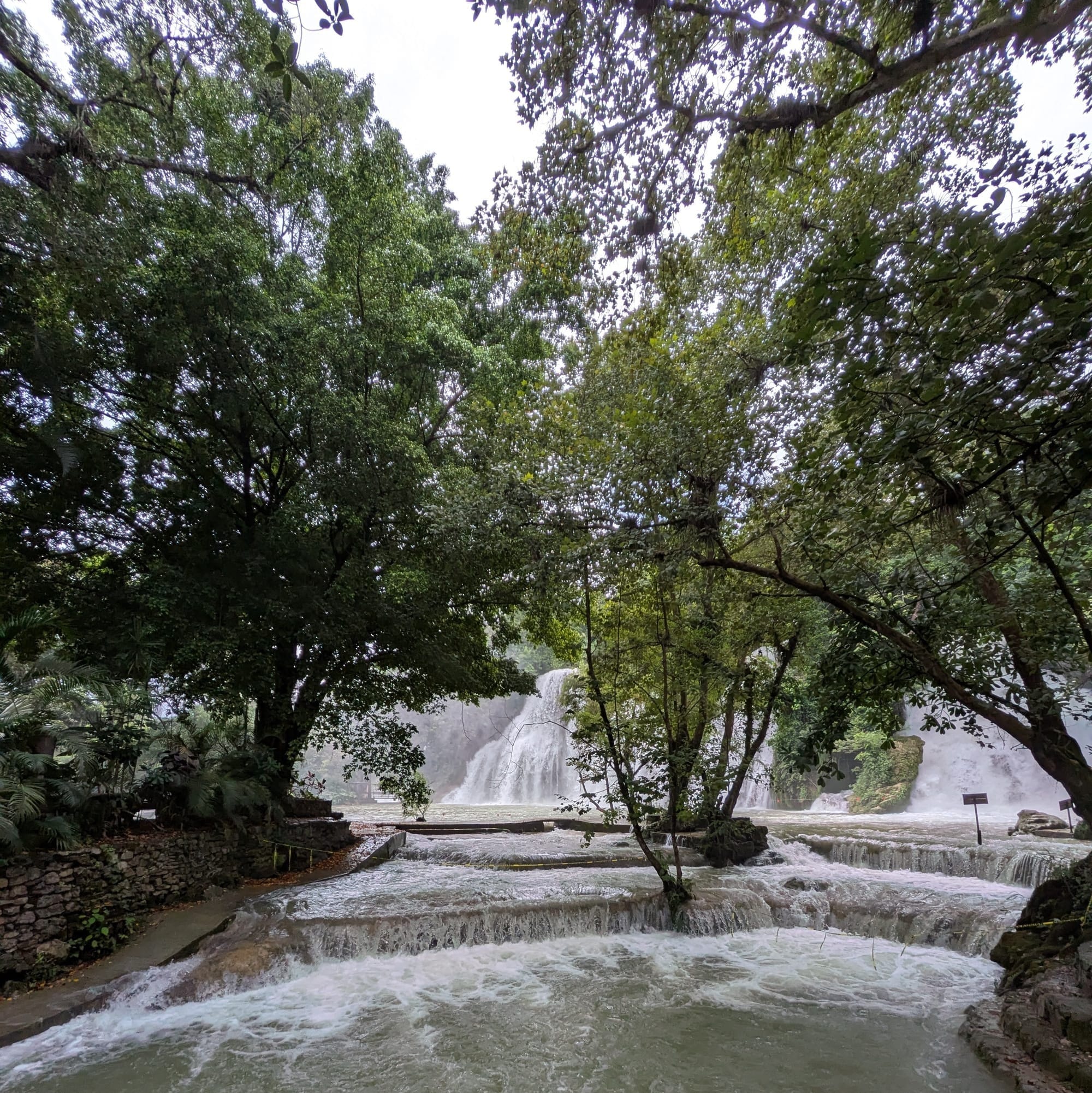
Every illusion ends when the state kills a citizen:
I started lumping the thoughtful, verbose, bars-heavy male rappers all together because I’m sure men who have opinions about them do. While I appreciate that Earl Sweatshirt, MIKE, mavi, El Costeau, Navy Blue, Niontay, and many others all exist, I can't say I reach for them when I want to listen to music. I've never considered myself an Open Mike Eagle devotee but I liked what he did–I saw him live at a college campus in 2013 and thought he was going somewhere but didn't know it would take Comedy Central and podcasting for him to develop a devoted audience. All to say Neighborhood Gods Unlimited from July is stunning. You feel like you’re in his head, and OME is a wry, subtle, careful storyteller, blessed with a rare, great combination rap- and singing voice.
If the billy woods album takes all the bile of the times and projects it outward–here is how we cope as empire falls–OME album turns it inward. He’s smart enough to not gesture at headlines, diminishing his human insights. By focusing on the most mundane observations (mourning a broken cell phone, upselling shoe brands for the commission, charting generations through wide-leg jeans) OME locates the ways in which a deteriorating modern condition alienates us from who we ought to be (“I'm a random in the ghetto/paying rent/nothing special”).
He doesn’t relish the barbershop talk, instead finding the way misinformation reaches people disheartening. He twists these observations into something metaphysical, open-hearted, and tender, not caustic, preachy, or corny. It also sounds nice and expensive, a treat for the ears. I braced myself after the “mercury in Gatorade” opening line but it’s a foretell of how he’s skeptical of his own skepticism. What is even real? Perfecting your voice is sometimes the greatest innovation.
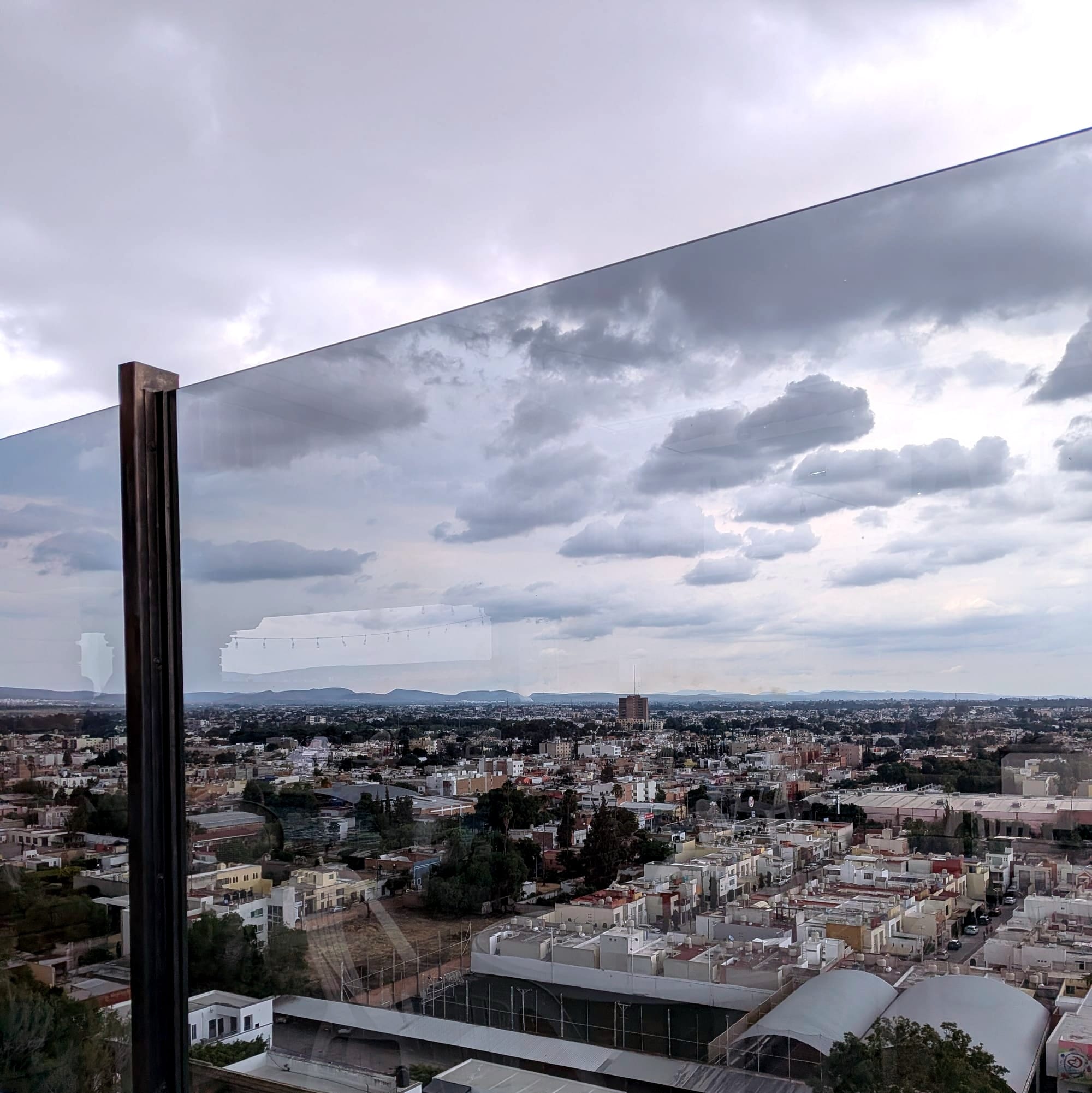
Like a smack on the ass at the back of a dream:
The verdict on Bleeds, the new Wednesday album: the first five songs are great, “Townies” through “Phish Pepsi” is their career apex of pop aspiration thus far, then it takes its foot off the gas in time for a Merle Haggard tribute; “Pick Up that Knife” is a late highlight even if it just retraces “Bull Believer”’s steps, then the record takes it time winding down to a close.
I’ve never listened to Drive-by Truckers or idk Southern Culture on the Skids but I like the songs on Bleeds that dust off the steel guitar and banjo while also turning up the volume on the guitar distortion the most. It’s not exactly a new sound, but I like how their records sound imperfect, dirtying up something that could easily fall into Austin City Limits aimless vibes-based Americana. Ymmv with Karly Hartzman’s singing but her affect sells the tableau scenes in her storytelling–she’s an emissary. When she sings about a high school lover who passed around her nudes then died, the line scans as fable, not ironic, jokey shit.
Even when the album toes the line between great and mad libs–if this was 2011 you could probably get 3,000 followers off a “Wednesday lyrics generator” account through stuff like “threw up in the pit at a Death Grips show,” “last time I saw you was a livestream of a funeral,” “grocery store sushi/chopping ketamine with a motel room key,” it remains true to every choice Hartzman makes as a songwriter, to every choice the band makes as a rootsy indie-rock band uniquely part of a southern music lineage. I keep thinking about Hartzman saying the more she travels the more she becomes obsessed with North Carolina–once you teeter into self-parody it can be bad or it can be proof of a completely inhabited world.
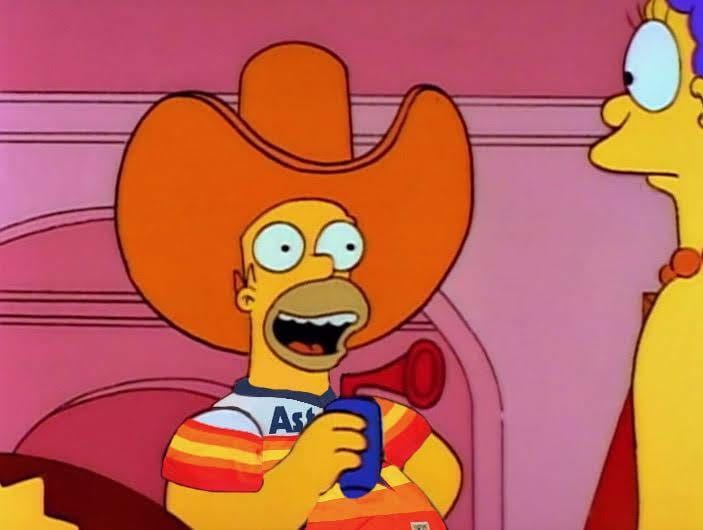
Parting words about professional baseball:
The last time my home team missed the playoffs Barack Obama was still in office. I wrote a bunch about following the Houston Astros for a decade, but if you don’t have the time for all that, what it comes down to is entering a world held up by baseball cliches turned me off of the game for the first 25 years of life. I never understood why I was a part of some narrative about the angst of Red Sox (pre-2004) or Cubs (pre-2016) or Mets (to this day) fans, I never understood why I had to care about the Yankees (obviously evil but with a winning pedigree) or the Dodgers (less evil but too omnipresent to be compelling) or the Cardinals (pure evil). There was an element of baseball fandom as predominantly white, moneyed, buoyed by institutional voices that were celebrating and mourning teams I didn’t care about as a huge barrier to entry to simply being like, yes I am a fan of my home team.
What made the Astros special to me is I didn’t have to inherit faux-folksy trauma or faux-exceptionalism to follow the team. It is important to see myself as part of a larger story. If I struggle sometimes with fitting into Philadelphia, it’s that there is no city–not New York, maybe Boston–whose story is so engraved I feel like I don’t have hope to ingratiate myself into the narrative. That may be self-involved or fatalistic but it’s my truth. Poe left; Lynch left; Iverson left. To use a phrase that makes me want to vomit, I crave a big tent, but what I crave even more is making my own tent.
The Astros made it easy to show up as myself and hold onto something great–ask the '20s Orioles or Judge-era Yankees or anyone at all if it’s easy to triumph. You have to make room to thrive. I like making room for people and I like giving myself room and if I don’t feel I can do those things I lose it a little bit. As Open Mike Eagle sez: “sometimes I get a little real big/my therapist said take up space/my little boy said take up space/my old blood said take up space.”
What I'm reading: Mayakovsky's Revolver
Listening to: Spooky Action at a Distance
Watching: Lake Mungo